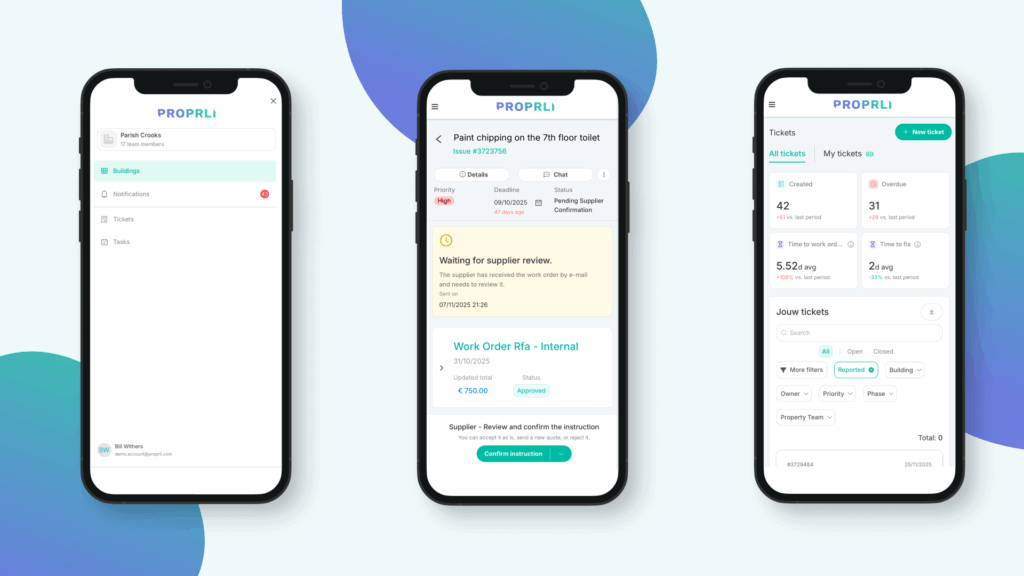In the rapidly evolving world of property management, artificial intelligence (AI) is transforming the landscape. AI-powered tools are making processes more efficient, enhancing the tenant experience, and reducing costs. This digital transformation is changing how properties are managed, leading to cost savings and better portfolio optimization.
AI is being applied in various property management areas, including leasing, maintenance, energy management, and tenant screening. Top property management software platforms are using AI to automate tasks, predict maintenance needs, and improve building performance. These property tech solutions help property managers make informed decisions and stay competitive in a fast-paced market.
As AI adoption in property management grows, it’s essential for technical property managers to adopt these advanced tools. By using AI-driven insights and automation, managers can focus on strategic initiatives, improve tenant satisfaction, and achieve long-term success. The future of property management will combine human expertise with AI, leading to a smarter, more efficient, and profitable industry.
Key Takeaways
- AI is transforming property management, offering cost savings and portfolio optimization opportunities
- Leading property management software platforms are integrating AI to automate tasks and predict maintenance needs
- AI-powered tools enable data-driven decision making and enhance tenant experiences
- Technical property managers must embrace AI to stay competitive and drive long-term success
- The future of property management lies in the integration of human expertise and artificial intelligence
The Rise of AI in Property Management
Artificial intelligence (AI) is transforming the property management industry, offering innovative solutions to streamline operations and enhance productivity. AI-powered tools are revolutionizing the way property managers handle their day-to-day tasks. This includes leasing, tenant screening, maintenance, and energy optimization.
One of the most significant benefits of AI in property management is automation. AI-powered software automates routine tasks such as invoice processing, data analysis, and marketing. This saves time and reduces the risk of human error, leading to increased efficiency and cost savings.
AI chatbots are another game-changer in the industry. These intelligent assistants work around the clock, addressing tenant inquiries, scheduling property tours, and assisting with rental applications. They provide instant, personalized responses, improving tenant satisfaction and helping property managers capture every lead.
Moreover, AI-driven predictive maintenance is transforming the way property managers handle repairs and upkeep. AI tools analyze data from various sources, such as energy consumption patterns, weather conditions, and occupancy rates. They anticipate potential equipment failures and provide recommendations for proactive maintenance. This reduces maintenance costs and enhances tenant satisfaction by minimizing disruptions.
| AI Application | Benefits |
|---|---|
| Automation | Streamlines operations, reduces human error, saves time and costs |
| Chatbots | Provides 24/7 tenant support, improves satisfaction, captures leads |
| Predictive Maintenance | Anticipates equipment failures, reduces maintenance costs, enhances tenant satisfaction |
As the adoption of AI in property management continues to grow, it is clear that these innovative tools are not just a trend but a necessity for staying competitive in the industry. By embracing AI-powered solutions, property managers can optimize their operations, improve tenant experiences, and ultimately drive better business outcomes.
Automating Routine Tasks with AI
AI-powered property management software is transforming how technical real estate managers manage day-to-day tasks. It automates processes like rent collection and sends reminders, saving a lot of time and resources. AI analyzes tenant data and preferences, allowing managers to tailor experiences. This personalization boosts satisfaction and keeps tenants longer.
AI chatbots are particularly effective in handling tenant communication. They offer quick answers to frequent questions, easing the workload for property managers. They also ensure tenants get timely and accurate information. AI’s data analysis improves decision-making, with a 50% efficiency gain and a 25% better forecast accuracy for market trends, as McKinsey notes.
Predictive maintenance is another key AI application in property management. AI identifies potential issues early, preventing costly emergencies. This approach cuts equipment downtime by up to 50% and extends asset life by 20-30%. Deloitte says this proactive maintenance can cut overall costs by 10-15%.
| AI Application | Benefits |
|---|---|
| Rent Collection & Reminders | Time & resource savings |
| Chatbots | Instant tenant support, reduced workload |
| Predictive Maintenance | 50% less downtime, 20-30% longer asset life |
| Data Analysis | 50% better decision-making, 25% improved forecasting |
By automating routine tasks and using AI insights, property management software helps managers optimize operations. It improves tenant experiences and boosts profitability. As AI evolves, it will become even more crucial in shaping property management’s future.
Enhancing Tenant Experience through AI
Artificial intelligence is transforming how property managers engage with tenants, offering personalized services that increase satisfaction and retention. AI tools use tenant data and preferences to suggest listings, amenities, and events tailored to their needs. Chatbots, powered by AI, provide instant support, answering questions and solving problems without human help. This improves response times and boosts efficiency.
AI-driven screening tools streamline the application process by analyzing applicant data to identify potential risks. This saves time and reduces human error. These systems can quickly process large amounts of information from various sources, ensuring thorough background checks while cutting down on administrative tasks. AI-powered lease management systems also automate tasks like adding addendums and managing applicant information, enhancing efficiency and accuracy.
Smart home technology, such as Nest thermostats, uses AI to recognize usage patterns and adjust settings automatically. This results in energy cost savings for tenants, improving comfort and showing a commitment to sustainability. By adopting AI solutions, property managers can create a more seamless and enjoyable living experience. This leads to higher tenant satisfaction and loyalty.
| AI-Driven Solution | Benefit for Tenants |
|---|---|
| Personalized recommendations | Tailored listings, amenities, and events |
| Chatbots | Real-time support and quick issue resolution |
| Screening tools | Faster application process and reduced risk |
| Smart home technology | Energy cost savings and improved comfort |
AI-Driven Predictive Maintenance
AI is transforming property management with predictive maintenance, a forward-thinking strategy that spots issues before they become major problems. It uses data from sensors and IoT devices to forecast equipment failures. This not only extends the life of essential assets but also cuts down on maintenance expenses. Such cost-cutting measures are pivotal for property tech, ensuring minimal tenant disruptions and efficient maintenance planning.
AI-driven predictive maintenance can slash errors in lease administration by up to 42% and lower operational costs by 15%. AI’s real-time monitoring can identify issues promptly, averting costly repairs and lowering deferred maintenance expenses. This approach not only saves money but also boosts tenant satisfaction by ensuring a more reliable living environment.
AI algorithms also excel in optimizing energy use and enhancing building system efficiency. By examining past energy use, occupancy patterns, and weather forecasts, AI can pre-cool buildings ahead of heatwaves. This reduces the load on HVAC systems and leads to substantial utility cost savings. Smart building technologies, powered by AI, can cut costs and lessen environmental impact by adjusting energy use according to occupancy and patterns.
| AI-Driven Benefit | Impact |
|---|---|
| Predictive Maintenance | Anticipates equipment failures, extends asset lifespan, reduces maintenance costs |
| Energy Optimization | Analyzes energy consumption data, optimizes usage, reduces utility expenses |
| Smart Building Technologies | Generates cost savings, reduces environmental impact, optimizes energy based on occupancy |
The integration of AI in real estate could unlock between €110 billion and €180 billion in value. As property management companies adopt AI and machine learning, they can remain competitive and thrive. Those who neglect to integrate these technologies risk being left behind in this rapidly changing field.
Optimizing Property Portfolio Performance with AI
AI is transforming the management of technical real estate portfolios. It uses vast data sets, like rent trends and maintenance needs, to guide decisions. This leads to better resource allocation and more efficient operations.
Predictive analytics is a major leap forward in optimizing portfolios. AI algorithms predict future trends and events, helping managers adjust strategies for better returns. For example, AI can cut turnover rates by 30% and emergency maintenance requests by 25% through smart planning.
AI also predicts tenant behaviors, like lease renewals or late payments. This allows for timely actions, improving operations and tenant satisfaction. Additionally, AI automates tasks, saving time and reducing costs by optimizing resource use.
AI tools in property management boost efficiency by automating tasks and offering insights for strategic decisions. They analyze tenant feedback to understand satisfaction levels and pinpoint areas for improvement. This leads to a better tenant experience and higher retention rates.
AI and Property Management: Challenges and Considerations
AI in property management brings many benefits but also poses challenges. Data privacy and security are key concerns, as AI systems handle vast amounts of sensitive information. It’s vital to comply with regulations like GDPR and CCPA to protect tenant and property data. Property managers must invest in strong security and transparent data practices to build trust and reduce risks.
Adopting AI technologies can be costly and complex. Smaller portfolio managers might struggle to justify the investment and navigate the implementation. Yet, AI is meant to augment human decision-making, not replace it. It automates routine tasks and offers insights, allowing managers to focus on strategic planning and tenant service.
Scaling operations is a common challenge, but AI provides a solution. AI-driven automation and analytics help manage larger portfolios efficiently with minimal resources. This scalability enables managers to expand their businesses while maintaining service quality. AI also streamlines tasks with existing vendors, enhancing availability in smaller markets.
| Challenge | AI Solution |
|---|---|
| Data privacy and security | Robust security measures and transparent data practices |
| Cost and complexity of adoption | Focus on enhancing decision-making and automating routine tasks |
| Scaling operations | Efficient management of larger portfolios with minimal additional resources |
| Vendor relationships | Streamlining administrative tasks and improving vendor availability |
The future of AI in property management looks bright. AI can transform the industry with predictive maintenance, dynamic pricing, and personalized tenant experiences. By assessing their needs, selecting the right tools, and training staff, property managers can integrate AI successfully. This integration will enhance efficiency, scalability, and service quality.
Emerging Trends in AI for Property Management
The integration of AI in property management is transforming the industry, offering innovative solutions to boost efficiency and tenant satisfaction. Smart buildings, equipped with sensors and automation systems, are becoming more common. These AI-powered systems can optimize energy use and cutting costs significantly. Predictive maintenance models also help anticipate equipment failures, allowing for proactive repairs and reducing downtime. This can lead to a 15-20% decrease in maintenance costs for some properties.
Virtual reality is another trend gaining traction for remote property tours, significantly reducing the need for in-person visits. This technology enables potential tenants to explore properties from anywhere, streamlining the leasing process and improving the tenant experience. AI-driven analytics tools also evaluate market conditions, track tenant satisfaction, and optimize pricing strategies. This helps maximize occupancy and revenue.
AI is also changing how administrative tasks are handled in property management. Automated systems can manage leases, collect rent, and handle tenant inquiries with greater accuracy and reliability. AI-powered chatbots provide 24/7 support, addressing tenant requests and reducing staff workload. By leveraging these AI solutions, property managers can focus on strategic decision-making and delivering exceptional service to tenants.
As AI adoption in property management grows, managers who embrace these trends will be well-positioned to enhance operations, improve tenant experiences, and stay competitive. However, it’s essential to address privacy and data security concerns, ensure cost-effectiveness, and regularly update AI systems. This ensures they meet evolving industry needs and tenant requirements.
Implementing AI in Your Property Management Operations
Adopting digital transformation in property management is crucial for staying ahead and saving costs. Begin by assessing your needs and choosing AI tools that meet your objectives. Opt for solutions that are easy to use, affordable, and updated regularly for peak performance.
Integrating AI into your operations can significantly impact several areas:
- Tenant screening and matching
- Predictive maintenance
- Fraud detection and security
- 24/7 tenant support via chatbots
- Property valuation and pricing optimization
Staff training is vital for a seamless transition and effective AI tool utilization. It’s important to balance automation with human interaction for superior tenant service. AI should enhance human capabilities, not replace them.
| AI Application | Potential Benefits |
|---|---|
| Tenant screening | Higher renter satisfaction, lower turnover rates |
| Predictive maintenance | Improved efficiency, reduced costs |
| Chatbots | Enhanced tenant support, efficient communication |
| Property valuation | Faster, more accurate valuations |
| Energy management | Reduced bills, smaller carbon footprint |
Embracing AI in property management can lead to increased productivity and lower operational costs. It also gives you a competitive edge in the market. With the right strategy and ongoing improvement, AI can help you achieve your goals and provide top-notch service to tenants.
Conclusion
The property management sector is undergoing a significant transformation, with artificial intelligence (AI) at the forefront. This technology promises to revolutionize automation, efficiency, and the tenant experience. By leveraging AI, managers can optimize their operations, cut costs, and make informed decisions that boost business growth. AI automates mundane tasks, optimizes rent, and predicts equipment failures, reshaping property management.
Yet, the integration of AI into property management comes with its own set of hurdles. Managers must invest in infrastructure and training to effectively use AI. They also need to address data privacy and security concerns. Moreover, striking the right balance between automation and human interaction is essential to maintain a personal touch and ensure tenant satisfaction.
Looking ahead, AI’s role in property management will only grow more pivotal. Those who adopt AI early will gain a competitive edge, reduce costs, and improve the tenant experience. By embracing the latest trends in property tech and automation, managers can fully harness AI’s potential. This will drive success in the rapidly changing world of property management.
FAQ
How can AI help property managers automate routine tasks?
AI property management tools automate tasks like rent collection, reminders, and maintenance requests. They also schedule appointments. This makes processes smoother, saves time, and lightens the load for property managers.
What are some examples of AI-powered tools for enhancing tenant experiences?
AI chatbots offer quick answers to tenant questions. Smart thermostats, like Nest, adjust settings for comfort and energy savings based on usage patterns. AI-driven screening tools analyze applicant data to ensure a safer tenant mix.
How does AI enable predictive maintenance in property management?
AI algorithms use data from sensors and IoT devices to spot issues early. This approach cuts maintenance costs, reduces tenant disruptions, and boosts building system efficiency.
What are the challenges of implementing AI in property management?
Challenges include data privacy and security, adhering to regulations like GDPR and CCPA, and the cost and complexity of new technologies. Managers must assess their needs, select the right tools, and train staff for successful AI integration.
What are some emerging AI trends in property management?
Trends include predictive analytics for better decision-making, smart buildings for energy efficiency and comfort, and virtual reality for remote property tours. Adopting these trends can enhance operations and tenant satisfaction.
How can property managers successfully implement AI in their operations?
Managers should evaluate their needs, pick the right tools, and invest in staff training. It’s important to balance automation with human interaction for excellent tenant service. AI tools must be cost-effective, easy to use, and regularly updated.






